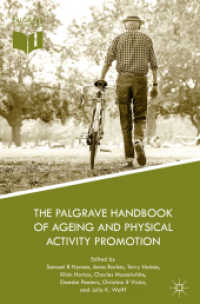- ホーム
- > 洋書
- > 英文書
- > Psychology
Full Description
Children Learn by Observing and Contributing to Family and Community Endeavors, the latest in the Advances in Child Development and Behavior Series provides a major step forward in highlighting patterns and variability in the normative development of the everyday lives of children, expanding beyond the usual research populations that have extensive Western schooling in common.
The book documents the organization of children's learning and social lives, especially among children whose families have historical roots in the Americas (North, Central, and South), where children traditionally are included and contribute to the activities of their families and communities, and where Western schooling is a recent foreign influence. The findings and theoretical arguments highlight a coherent picture of the importance of the development of children's participation in ongoing activity as presented by authors with extensive experience living and working in such communities.
Contents
1. A Cultural Paradigm - Learning by Observing and Pitching In
Barbara Rogoff, Rebeca Mejía-Arauz and Maricela Correa-Chávez
Children Observing and Pitching In
2. Collaborative Work or Individual Chores: The Role of Family Social Organization in Children's Learning to Collaborate and Develop Initiative
Rebeca Mejía-Arauz, Maricela Correa-Chávez, Ulrike Keyser Ohrt, and Itzel Aceves-Azuara
3. Children's Everyday Learning by Assuming Responsibility for Others: Indigenous Practices as a Cultural Heritage across Generations
David Lorente Fernández
4. Supporting Children's Initiative: Appreciating Family Contributions or Paying Children for Chores
Andrew D. Coppens and Lucía Alcalá
5. Adults' Orientation of Children — and Children's Initiative to Pitch in — to Everyday Adult Activities in a Tsotsil Maya Community
Margarita Martínez-Pérez
6. Respect and Autonomy in Children's Observation and Participation in Adults' Activities
Fernando A.García
7. The Hidden Life Behind 'Observing' and 'Pitching in:' Mayan Children's Creation of Learning Ecologies by Initiative and Co-operative Actions
Lourdes de León
8. Children's Avoidance of Interrupting Others' Activities in Requesting Help: Cultural Aspects of Considerateness
Omar Ruvalcaba , Barbara Rogoff , Angelica Lopez , Maricela Correa-Chavez and Kris Gutierrez
9. Young Children's Attention to What's Going On: Cultural Differences
Katie G. Silva, Priya M. Shimpi , Barbara Rogoff and Santa Cruz
10. Día De Los Muertos: Learning about Death through Observing and Pitching In
Isabel T. Gutiérrez, Karl S. Rosengren and Peggy J. Miller
Learning by Observing and Pitcing in (LOPI) Fits with Cultural Cosmovisions
11. Conceptions of Educational Practices Among the Nahuas of Mexico: Past and Present
Marie-Noëlle Chamoux
12. Learning to Inhabit the Forest: Autonomy and Interdependence of Lives from a Mbya-Guarani Perspective
Carolina Remorini
13. Learning and Human Dignity are Built Through Observation and Participation in Work
Rafael Cardoso Jiménez
14. Learning by Observing, Pitching In and Being in Relations in the Natural World
Megan Bang, Ananda Marin, Douglas Medin and Karen Washinawatok
15. Using History To Analyze The Learning by Observing and Pitching In (Lopi) Practices Of Contemporary Mesoamerican Societies
Rubén Flores, Luis Urrieta, Marie-Noelle Chamoux, David Lorente Fernández and Angélica López
16. "My Teacher is Going to Think They're Crazy”: Responses to LOPI Practices in U.S. First Grade Classrooms
Jennifer Keys Adair
17. Learning by Observing and Pitching-In and the Connections to Native and Indigenous Knowledge Systems
Luis Urrieta
18. Children's Participation in Ceremonial Life in Bali: Extending LOPI to other Parts of the World
Yolanda Corona, Dewa Ayu Eka Putri and Graciela Quinteros








